You are here
Former Generals
General William Booth - 1860 to 1912
The Founder and first General, William Booth was born in England in 1829 and converted in 1844. He died, or in Army terminology was "promoted to glory", in 1912. In Booth's lifetime, the rag-tag  Salvation Army grew into a giant of international evangelism and gained a modicum of acceptance. In his lifetime the Army was established in 58 countries and colonies
Salvation Army grew into a giant of international evangelism and gained a modicum of acceptance. In his lifetime the Army was established in 58 countries and colonies
William Booth (1829-1912) was a brave man, hard to the point of militancy yet soft enough to cry tears of compassion with those seeking answers to their spiritual quest, or facing grief and bereavement. Booth worked tirelessly to bring Christ to people through the words of the gospel and Christian love in action.
General Booth once said he would stand on his head and play a tambourine with his feet if it would bring people to God. The Founder of The Salvation Army, Booth did a great deal to take a relevant Christianity to the masses, meeting people at the point of their needs.
With its title inspired by the adventures of Scottish missionary and African explorer, Dr David Livingstone, Booth's book In Darkest England and the Way Out set the standard for the Army's social endeavours in his time and for the years to come.
Read more about William and Catherine Booth.
General Bramwell Booth - 1912 to 1929
William Booth's oldest son and immediate successor, Bramwell was born in 1856. Bramwell's position as General came about when a sealed envelope from the Founder was opened following Booth's 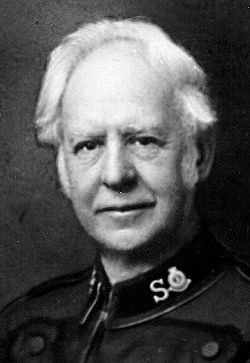 death.
death.
Thus Bramwell Booth, aged 56, took his place as The Salvation Army's second general. An able administrator, he was largely responsible for The Salvation Army's structural development. He had served as "Chief of the Staff" (second in command) for 32 years and was the General from 21 August 1912 to 13 February 1929.
In his seventies, he was suffering from poor health and would not retire, so The Salvation Army's "High Council" was convened - for the first time - in 1929. This High Council was a system designed by the Founder to safeguard the succession of leadership of The Salvation Army. The council resolved that Bramwell Booth was "unfit on the ground of ill-health" and proceeded to elect Edward Higgins as General.
Bramwell Booth died on 16 June 1929, four months after the election of General Higgins.
One of Bramwell Booth's most enduring legacies was successfully steering The Salvation Army through the carnage and destruction of the "war to end all wars" (World War I).
General Edward Higgins - 1929 to 1934
Born in 1882, Higgins served variously in corps (parish) work, divisional and territorial appointments in the United Kingdom and the United States of America. He was Chief of the Staff from 1919, until elected General by the first-ever High Council in 1929.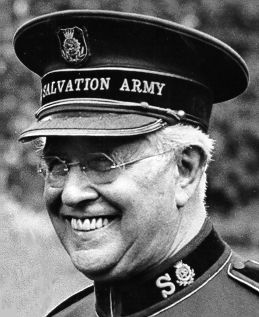
One of Higgins' most crucial tasks was regaining the confidence of the American public as the second-in-command, or Chief Secretary, of The Salvation Army in the USA, following the departure of former leader Ballington Booth.
Later, as General, Higgins promoted, through a Parliamentary Committee, a new legal footing, The Salvation Army Act 1931, which provided that (1) Generals be elected by a High Council and (2) that such Salvation Army assets as had been held in the name of a General be vested in a Salvation Army Trustee company. These changes reduced the absolute powers the position of General had previously been both entrusted and burdened with.
Higgins served as General until his retirement in 1934 and died in 1947, aged 83.
General Evangeline Booth - 1934 to 1939
The first female General, and the fourth daughter of William and Catherine Booth, Evangeline was born in 1865, the same year The Salvation Army was born. 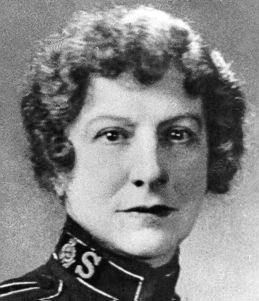
As her name suggests, she was a successful evangelist and had preaching, administrative and teaching positions in the United Kingdom, Canada and the United States of America before she was elected General in 1934, aged 69.
During her term, the Order of the Silver Star (a recognition of mothers whose children made the sacrifice of serving as Salvation Army officers) was extended from the US to the whole Salvation Army world.
Evangeline adopted four children. She was known for her athleticism in younger days (a talented diver), and for her equestrian skills. Her favourite musical instrument was the harp, which she often used for stage presentations.
Evangeline Booth retired in 1939 and died in 1950, aged 88.
General George Carpenter - 1939 to 1946
The first Australian General, Carpenter was born in 1872. He worked variously in property, training, editorial and administrative work in Australia and the United Kingdom. 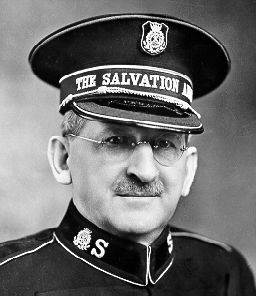
What was discreetly described as "a conflict of loyalties", in honest criticism to Bramwell, resulted in his re-appointment to Australia to take up the editorial work (from 1927-1933) he had left two decades earlier. His humility and faithful service during that time stand out as hallmarks of his character and leadership.
Aged 67, Carpenter was elected General on 24 August 1939 by 35 of 49 votes. He assumed command on 1 November. It was Carpenter's weighty responsibility to encourage Salvationists as they entered the Second World War, both as combatants and non-combatants.
Carpenter retired in 1946 and died in 1948, aged 76.
General Albert Orsborn - 1946 to 1954
Born in Clapton, England, in 1886, Orsborn served variously in pastoral, training and administrative work in New Zealand and throughout the UK. Orsborn was elected General on 9 May 1946, with 36 of 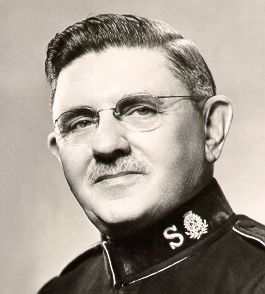 46 votes cast. He assumed command on 21 June.
46 votes cast. He assumed command on 21 June.
Orsborn's priorities were to continue the evangelical emphasis of Salvationists, to renew The Salvation Army's world fellowship (so ravaged by war) and to consider the best way to broaden the base of the General's authority. He inaugurated the advisory Council to the General, appointing senior leaders to survey existing activities, plan new developments and assess how to change to meet the needs of a changing world.
Orsborn instituted the first Brengle Memorial Institute, a holiness retreat named after one of the Army's most respected teachers and leaders. He also approved The Salvation Army's participation as a founding member of the World Council of Churches.
Orsborn served as General until 1954. He died in 1967, aged 81.
General Wilfred Kitching - 1954 to 1963
Born in Wood Green, London, Kitching became a Salvation Army Officer in 1914, aged 20. Kitching served for over 30 years in corps, divisional, national headquarters and international appointments.
Kitching married Kathleen Bristow in 1929. In 1946, he was sent to serve in Australia South as Chief Secretary. In 1948 he headed to Sweden to serve as Territorial Commander, and in 1951 he became British Commissioner.
The Commissioner was elected General of The Salvation Army by the High Council in 1954. During his years as an officer, Kitching wrote many songs in The Salvation Army songbook. In 1961 he was awarded a Hon. LLD in Yonsei, Korea, and CBE in 1964. Kitching also wrote two books: Soldier of Salvation (1963) and his autobiography, A Goodly Heritage (1967).
General Kitching died age 84.
General Frederick Coutts - 1963 to 1969
Born in Scotland in 1899, Coutts served as a flying officer in the Royal Air Force. He was commissioned as a Salvation Army officer in 1920 and served variously in pastoral, administrative, training and  literary appointments in England and Australia before being elected General on 1 October 1963, having secured 30 of 49 votes. He assumed command on 23 November.
literary appointments in England and Australia before being elected General on 1 October 1963, having secured 30 of 49 votes. He assumed command on 23 November.
One of the more controversial decisions under Coutts' leadership was the formation of The Salvation Army's first pop group, the "Joystrings", which appeared on television and in night clubs and cabarets, once again breathing relevance into Salvationists' use of music.
A scholarly, self-effacing man, Coutts was the model of courtesy whose thoughtful arguments were often phrased as highly polite suggestions. Coutts served until 1969 and died in 1986, aged 87.
General Erik Wickberg - 1969 to 1974
The first European General, Wickberg was born in Switzerland in 1904. He was fluent in Swedish, German, French and English and a gifted chess player, once defeating the Swiss national champion.
Wickberg was commissioned as an officer in 1925. He served variously in pastoral, training and administrative duties throughout the United Kingdom and Europe and as Chief of the Staff. Wickberg was elected General on 23 July 1969 with the needed two-thirds majority on the first ballot. He assumed command on 21 September.
The great influence of Wickberg's Generalship - as the first non-Anglo-Saxon General - was the empowering of local leadership. By placing locals in charge of The Salvation Army's work in their own countries, Wickberg strengthened The Salvation Army's multiracial and multinational character.
Wickberg retired in 1974 and died in 1996, aged 92.
General Clarence Wiseman - 1974 to 1977
The first Canadian General, Wiseman was born in 1907 and was commissioned as a Salvation Army officer in 1927. He served variously in pastoral, editorial, military chaplaincy, missionary, training and  administrative positions in Canada, the United Kingdom and Africa.
administrative positions in Canada, the United Kingdom and Africa.
Wiseman was elected the 10th General on 13 May 1974 and assumed command on 6 July. Due to retirement age, Wiseman served for three years (less two days), a shorter term than any of his predecessors. He had been nominated as a candidate for the Generalship at the 1969 High Council but had felt led to withdraw it.
The General's evangelical zeal and concern for The Salvation Army's work in many third-world countries - where people faced disease, famine and poverty - led to advanced training for potential leaders from Asia and Africa in 1976.
Wiseman retired in 1977 and died in 1985, aged 78.
General Arnold Brown - 1977 to 1981
Born in London in 1913, Brown's family immigrated to Canada. He was commissioned as an officer in 1935.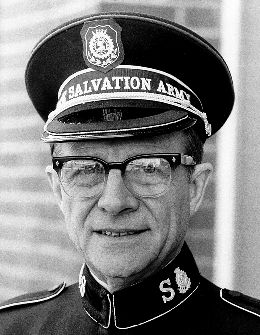
Brown's service prior to the Generalship was variously in pastoral, editorial, public relations, youth work and administrative roles, in Canada and the United Kingdom. It included pioneering religious radio and television broadcasting for The Salvation Army, with radio and television series being used in Canada, the United States and Australia.
Brown served as The Salvation Army's second-in-command, the Chief of the Staff, from 1969-1974. Aged 64, he was elected General on 5 May 1977 with 35 of 41 votes on the first ballot. He assumed command on 5 July.
Under Brown's leadership the Salvation Army Act 1980 was approved by the British Parliament, providing an updated constitutional framework for The Salvation Army. Among other noteworthy activities, a divorce commission was established to address divorce and separation within The Salvation Army's ranks.
Following consultation with international Army leaders, Brown led The Salvation Army's withdrawal from the World Council of Churches. This was because of the WCC's political leanings and pressure for eucharistic union vis-a-vis The Salvation Army's non-observance of the sacraments.
Brown retired in 1981 and died in 2002, aged 89.
General Jarl Wahlstrom - 1981 to 1986
Born in Finland in 1918, Wahlstrom was commissioned as an officer in 1938. When World War II commenced, he was called up for military service and served as battalion chaplain for Finnish forces.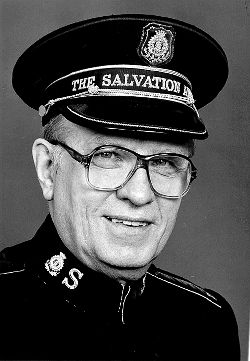
Wahlstrom served variously in pastoral, youth work, military chaplaincy, training and administrative roles in Canada, Europe and the United Kingdom. Aged 63, he was elected General on 23 October 1981 with 35 of 44 votes. He assumed command on 14 December.
Wahlstrom's activities included a visit to communist East Germany (from Berlin), and a six-day Holy Land Congress involving 1,500 delegates from 23 countries. Wahlstrom was known as the "Caring General" throughout his four-and-a-half years as General.
Wahlstrom retired in 1986 and died in 1999, age 81.
General Eva Burrows - 1986 to 1993
Eva Burrows AC is only the second Australian to be elected as "General" (from 1986 to 1993), the worldwide leader of The Salvation Army. She is also the second woman to serve in this role, after the 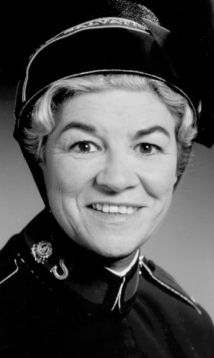 Founder’s daughter Evangeline Booth (who served as General from 1934 to 1939).
Founder’s daughter Evangeline Booth (who served as General from 1934 to 1939).
Born in 1929, Burrows was also the youngest person ever elected to the office of General.
A keen student, she earned her BA at Queensland University and was commissioned an officer in London in 1950. While completing post-graduate studies at London University, Burrows served in corps (church) work. She also served variously in pastoral, missionary, training and administrative roles in her native Australia, the United Kingdom, Africa and Sri Lanka.
Burrows was elected General on 9 January 1986 on the fourth ballot. She assumed command on 2 May. Her policy achievements included the return of The Salvation Army to communist countries which had previously banned its ministry, the restructuring and separation of the International Headquarters and the United Kingdom Territory, and a strong stance against apartheid in South Africa as "a philosophy of life that is contrary to the teachings of Christ". General Burrows was known as the "people's General".
By postal ballot, The Salvation Army's High Council - with an almost unanimous vote -chose to extend the General's term an additional two years, to bring to fruition substantive initiatives. The General served in that capacity until her retirement in 1993 and lives in Melbourne, Australia.
The General’s warmth, wit and passion while in office and in her retirement are well-matched with an astonishing memory for names and an ability to communicate with people from all ages and backgrounds. Sometimes referred to as The Salvation Army’s "Global Parent" while in office, the General was a strong influence for renewal in The Salvation Army in Australia and throughout the world.
Eva Burrows died (or in Army terminology was 'Promoted to Glory') on the 20th of March 2015.
General Bramwell Tillsley - 1993 to 1994
Tillsley was born in 1931 and was commissioned as an officer in 1956. He served variously in pastoral, youth work, training and administrative positions in Canada, the United States of America, the 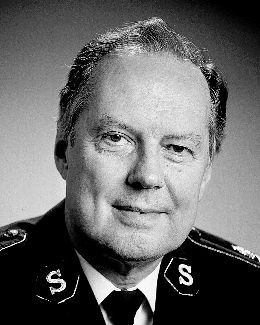 United Kingdom and Australia before being appointed Chief of the Staff in 1991.
United Kingdom and Australia before being appointed Chief of the Staff in 1991.
Like many of his forebears and contemporaries, Tillsley is a gifted writer and communicator. He received his BA in Philosophy from the University of Western Ontario.
Tillsley became General following a triple by-pass operation in June 1992. He was elected General on 28 April 1993 on the fourth ballot. He assumed command on 9 July.
In May 1994, Commissioner Earle Maxwell (Chief of the Staff) announced the General had relinquished that office, effective immediately, following a major breakdown in his health due to a previously undetected congenital weakness of his heart. The General lives in Canada.
General Paul Rader - 1994 to 1999
Born in 1934, the 15th General was the first American General.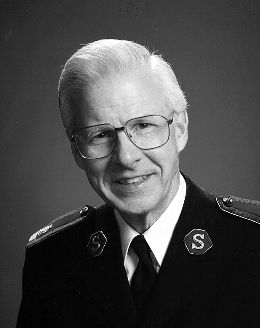
Rader's studies at Asbury College, Asbury Theological Seminary and Southern Baptist Seminary resulted in BA, BD and MTh degrees. He later received a Doctor of Missiology degree from Fuller Theological Seminary School of World Mission. He served variously in pastoral, missionary, training and administrative positions in the United States and Korea.
Rader was elected General on 23 July 1994 with an unprecedented unanimous vote. He assumed command from that date.
Rader's tenure was marked by major advances in continuing the equalising of women's places in The Salvation Army. Married women officers now hold a rank in their own right, which means that qualified married women now participate through the High Council in the electing of the General.
Other landmark events were the launch of The Salvation Army's official web site in 1995 and a 1997 international youth forum in Capetown, South Africa, with more than 500 delegates. The establishment of a Spiritual Life Commission may have long-lasting effects on the worship and outreach of Salvationists in the new millennium.
Rader retired as General in 1999.
General John Gowans - 1999 to 2002
John Gowans was born in Blantyre, Scotland, on 13 November 1934, the third of five children. His parents were Salvation Army officers, constantly moving around the country as their work demanded. 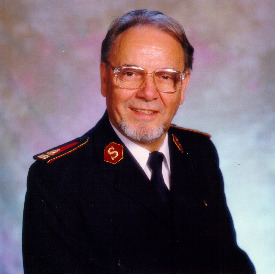 Moving south with them, as a teenager, John attended the 350-year-old Halesowen Grammar School, Worcestershire, where he gained a love for drama and English Literature, a love which has never left him.
Moving south with them, as a teenager, John attended the 350-year-old Halesowen Grammar School, Worcestershire, where he gained a love for drama and English Literature, a love which has never left him.
At 18, and with plans to train for the teaching profession, like most young men in the 1950s John undertook compulsory military service. Electing to join Her Majesty's Army, John's first choice was the Army Catering Corps. However, the wisdom of the military personnel selection officer prevailed and he was directed to the Royal Army Educational Corps.
He spent his two years of national service in Germany, forming what was to be excellent foundations for his calling in which teaching was to play an important part.
In 1954, John Gowans entered the International Training College. There he met his wife Gisèle Bonhotal who, before entering officer-training college from the Paris Central Corps, was a qualified children's nurse. French by birth and like John's, Gisèle's parents were both officers. The couple were married in Paris in 1957 and have two sons John-Marc and Christopher.
In 1967, the then Captain Gowans demonstrated his writing capacity when, with Captain John Larsson, he wrote the musical Take-Over Bid. This was a breakthrough and hugely popular in The Salvation Army throughout the world. It was translated into many languages. Nine other musicals followed this success and John Gowans became renowned for innovation, experimentation and inspiration, whilst always re-endorsing the traditional biblical values on which The Salvation Army rests. He has also written three books of prayer poems under the title of O Lord!
The Gowans served in different corps in the British Territory over a period of 16 years. When John was appointed National Stewardship Secretary, Gisèle combined her role as organiser of the International Youth Fellowship with work in one of The Salvation Army's London maternity homes.
After a period as divisional leaders in Manchester, UK, Lieut-Colonel John Gowans became Chief Secretary and Mrs Gowans Territorial Home League Secretary in France. The couple was then appointed to Los Angeles in the USA Western Territory. Here John served as Secretary for Programme, and Gisèle as Territorial Secretary of the Nurses Fellowship.
After serving as leaders of the Southern California Division the couple returned to France in September 1986 as leaders of that territory. Seven years later they were appointed Territorial Leaders of the Australia Eastern and Papua New Guinea Territory, which included responsibility for the work of The Salvation Army in New South Wales, Queensland and the Australia Capital Territory.
In April 1997, Commissioner John Gowans returned to his homeland to take command of the United Kingdom Territory with the Republic of Ireland, and Commissioner Gisèle Gowans became Territorial President of Women's Organisations.
The High Council elected John Gowans as the 16th General of The Salvation Army on 15 May 1999. General Gowans took office on 23 July 1999, with Commissioner Gisèle Gowans as World President of Women's Organisations.
Gowans retired as General in 2002 and died 8 December 2012.
General John Larsson - 2002 to 2006
Having become an officer from Upper Norwood Corps in 1957, Commissioner John Larsson spent 23 years in various appointments in the United Kingdom - as corps officer, in training work, as territorial 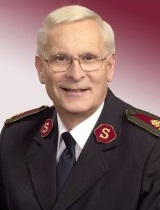 youth secretary in Scotland and then as national youth secretary, British Territory.
youth secretary in Scotland and then as national youth secretary, British Territory.
Commissioner Freda Larsson (née Turner) became an officer from Kingston-on-Thames in 1965 and served as a corps officer, area youth officer and area secretary before her marriage in 1969, and afterwards as corps officer, territorial guide organiser in Scotland, and assistant in the Youth Department at National Headquarters.
In 1980, Commissioner John Larsson became the chief secretary of the South America West Territory, and Commissioner Freda Larsson the territorial home league secretary. They returned to England in 1984, with Commissioner John Larsson taking an appointment as principal of the International Training College and Commissioner Freda Larsson serving as college librarian.
From July 1988 until November 1990, Commissioner John Larsson was Assistant to the Chief of the Staff for United Kingdom administrative planning, and Commissioner Freda Larsson was coordinator for married women officers at International Headquarters. Commissioner John Larsson was then appointed territorial commander of the United Kingdom Territory and Commissioner Freda Larsson territorial president of women's organisations. The commissioners served in similar capacities in the New Zealand and Fiji Territory from 1993 to 1996, and in the Sweden and Latvia Territory from 1996 to 1999.
On 1 August 1999, Commissioner John Larsson was appointed Chief of the Staff at International Headquarters, and Commissioner Freda Larsson was appointed World Secretary for Women's Ministries and World President of SA Scouts, Guides and Guards, International Headquarters.
On 6 September 2002, Commissioner John Larsson was elected as successor to General John Gowans, who retired from active service at midnight on Tuesday 12 November 2002.
The 2002 High Council was the largest in the history of The Salvation Army and included 87 members - 49 men and 38 women - who direct the work of The Salvation Army around the world. Following the counting of the ballots, it was announced by the President that Commissioner John Larsson had received over two-thirds of the vote and was thereby duly elected as the 17th General of The Salvation Army.
Personal and organisation congratulations were then extended to the General-elect and his wife, Commissioner Freda Larsson, and the necessary legal documents were signed confirming and authenticating the election. The General-elect was then invited to address the Council.
Commissioner Larsson spoke of the awesomeness of the responsibility to follow in a line of succession of such distinguished Generals. He pledged not to attempt to imitate any of them but to be the unique person and leader God had called him to be. He concluded with a reference to his grandfather, Commissioner Karl Larsson, who took as his motto, 'Work, for the night is coming.' 'I want to dedicate every day, every hour, every power,' said the General-elect, 'to advance the Lord's work through the Army.'
Larsson retired as General in 2006 and died 18 March 2022, aged 83
General Shaw Clifton - 2006 to 2011
General Shaw Clifton was born in Britain on 21 September 1945. He married Helen Ashman on 15 July 1967.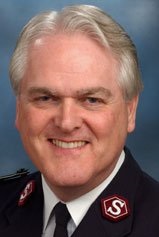
He was commissioned as a Salvation Army officer in Edmonton Corps, British Territory, on 5 July 1973.
He served an appointment to the Rhodesia Territory in 1975 and returned to Britain as a Corps Officer in January 1979.
In June 1982, Clifton was named the Legal and Parliamentary Secretary at International Headquarters where he served for 7 years, before returning to duties as a Corps Officer in 1989.
He was then appointed in May 1992 as a Divisional Commander in the United Kingdom Territory with the Republic of Ireland. After 3 years he was then appointed as Divisional Commander in the USA Eastern Territory in June 1995.
Additional responsibilities overseas were assigned to Clifton when he was appointed as Commissioner and made Commander of the Pakistan Territory in 1997. This was followed in March 2002 with an appointment as Territorial Commander of New Zealand, Fiji and Tonga.
After 9 years abroad, Clifton returned to Britain as Territorial Commander of the United Kingdom Territory with the Republic of Ireland in June 2004.
He was elected by the High Council to become General on 29 January 2006. Under his leadership, the work of The Salvation Army has expanded from 111 to 123 countries.
The General and his wife, Commissioner Helen Clifton, have also actively worked to aid the plight of struggling women and children around the world, including mobilising The Salvation Army in a concerted effort against human trafficking.
General Linda Bond - 2011 to 2013
Canadian-born Commissioner Linda Bond was The Salvation Army's 19th General and world leader. 
She became the third woman and the fourth Canadian to hold the post of General of The Salvation Army since the international church and charity organisation was founded 146 years ago.
Commissioner Bond had previously served as leader of the Australian Eastern Territory (ACT, NSW and Qld) from 2008, and was elected General by the High Council (made up of senior Salvation Army leaders from around the world) on 31 January 2011 in Sunbury-on-Thames near London.
Commissioner Bond became the head of more than one million Salvationists around the world, with The Salvation Army having more than 100,000 employees communicating in 175 different languages.
Commissioner Bond retired as General in 2013.
General André Cox - 2013 to 2018
Born in Harare, Zimbabwe, to an English father and Swiss mother, André Cox spent his childhood years in Zimbabwe and the United Kingdom, before moving to Switzerland, where he met his wife and 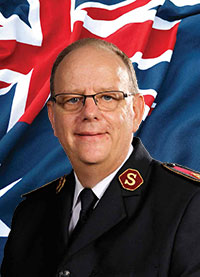 from where they entered training to become Salvation Army officers, taking up their first appointments in 1979.
from where they entered training to become Salvation Army officers, taking up their first appointments in 1979.
In the early years of his Salvation Army officership, General Cox held appointments in Switzerland and Zimbabwe. More recently he has served as the territorial commander in the Southern Africa Territory, the Finland and Estonia Territory and the United Kingdom Territory with the Republic of Ireland. In February 2013 he was appointed as Chief of the Staff – second in command of the international Salvation Army and in August 2013 became the 20th General of The Salvation Army.
He retired as General in 2018.
General Brian Peddle - 2018 to 2023
General Brian Peddle is the 21st General of The Salvation Army taking office on 3 August 2018, following election at the 2018 High Council.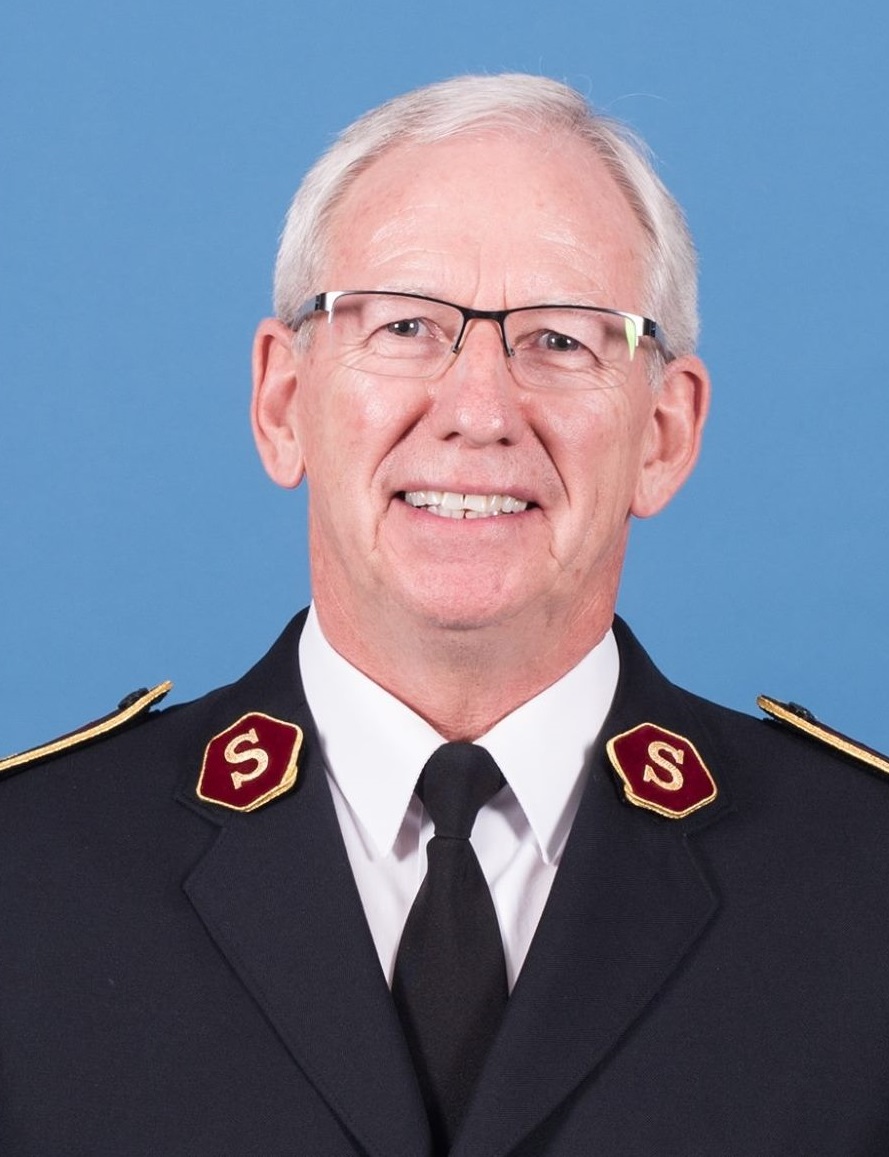
Commissioned and ordained as a Salvation Army officer in 1977, General Brian Peddle has served in partnership with his wife, Commissioner Rosalie Peddle, since their marriage in 1978. Initial service in his home territory of Canada and Bermuda included corps, divisional and training college appointments.
The General’s first international appointment was to Auckland, in the New Zealand, Fiji and Tonga Territory. He was later transferred to the United Kingdom with the Republic of Ireland Territory. A return to the Canada and Bermuda Territory followed in 2011, to take up leadership as territorial commander, with promotion to the rank of commissioner.
Service at International Headquarters initially came in 2014 as International Secretary for Americas and Caribbean, prior to his appointment as Chief of the Staff on 1 November 2015.
General Brian Peddle retired as General in 2023.